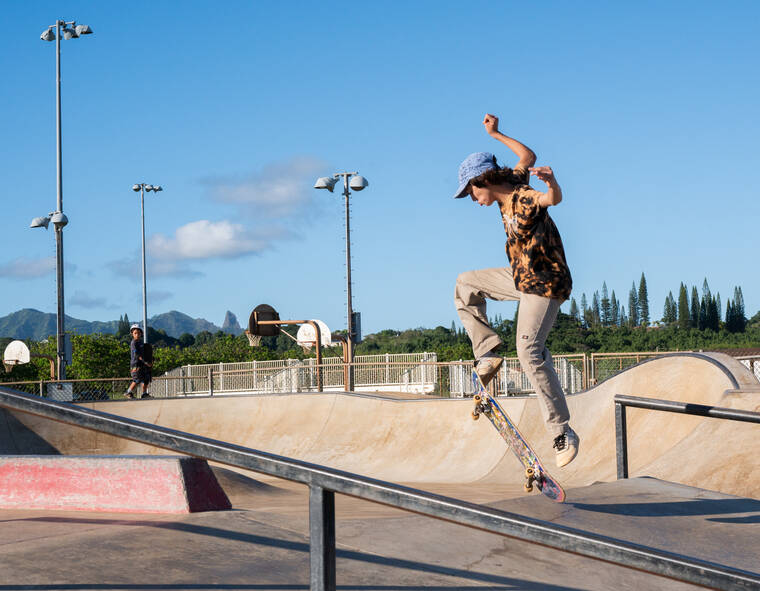LIHU‘E — The Department of Land and Natural Resources Division of State Parks invites people to review and provide suggestions to the Statewide Comprehensive Outdoor Recreation plan, or SCORP for short.
Public comments are requested by Nov. 19.
Every five years the plan assesses outdoor recreation trends, needs and priorities and provides direction for the recreational future.
The SCORP plan is required for the state to remain eligible to receive federal funds for outdoor recreation projects administered through the Land and Water Conservation Fund.
Pickleball courts continue to be popular recreation spots on Kaua‘i, according to the plan.
To meet pickleball demand, the County of Kaua‘i Department of Parks and Recreation resurfaced the tennis and basketball courts at Kalawai Park in Kalaheo with new backstops and nets and added striping for pickleball.
While restriping does help meet demand for pickleball recreation areas, recreation providers continue to report demand for more courts.
Skateboarding popularity is surging on Kaua’i.
The resurfaced skate park in Kapa‘a has been wildly popular with youth and families, and its success has in part triggered a new program of “pop-up” skate parks in Hanapepe and Lihu‘e. The Kaua‘i skate community continues to pursue more skate facilities on island.
Rock climbers want legitimacy and legal access to climbing areas.
Over 130 comments were received about rock climbing statewide, with climbers on Kaua‘i and O‘ahu being particularly concerned.
During the Kaua’i public meeting on April 12 conducted over Zoom, of the nine participants that responded to the question, “Are you involved in an outdoor recreation activity that you feel needs more or improved facilities?” four participants responded with concerns about climbing access.
“As a climber, I would like to see rock climbing allowed with guidelines for responsible cultural and environmental sensitivities,” said one respondent.
“I hate to sound like a growing record, but we would like to see rock climbing allowed,” responded another participant.
Climate change is a big concern for public participants.
Through the SCORP update process, outdoor recreation providers expressed concern regarding the impacts of climate change to outdoor recreation areas.
The report acknowledged the documented loss of recreational facilities along certain shorelines such as the Kapa‘a Beach Park.
According to wetland resource managers, coastal wetlands will change and disappear as sea levels rise as a result of climate change and storms intensify.
It was noted that as some wetlands will be lost due to ocean intrusion and new wetlands will arise in different locations. Public participants in both the public survey and meetings expressed concern regarding damage or loss of cultural sites and facilities because of climate change.
Agriculture opportunities
Hawai’i residents show interest in the cultivation of kalo (taro) in irrigated wetland field systems called lo‘i. This historically and culturally significant plant can also be a method of flood control according to the report.
The report notes that the cultivation of lo‘i kalo and similar practices are not recreational activities, but practices of deep cultural significance.
Lo‘i kalo have successfully been integrated at Ha‘ena State Park on Kaua‘i, where raising kalo serves as a medium for intergenerational transfer of knowledge; outdoor service activity; and as an interpretive device. In Hanalei, Kaua‘i, agricultural producers grow kalo commercially within the Hanalei National Wildlife Refuge.
Visitor management continues to be a concern.
Hawai‘i Tourism Authority has initiated Destination Management Action Plans for each of the islands focusing on regenerative tourism.
According to the Kaua‘i DMAP for 2021 through 2023, regenerative tourism “takes sustainability one step further and focuses on the net benefit of the visitor economy to a destination, looking at the social and cultural benefits. Regenerative tourism is bolder and more inspiring. It aims not just to do less harm, but to go on and restore the harm that our system has already done to the natural world.”
Surveys and community meetings informing the SCORP report were held between April and June 2021.
More than 2,600 people participated in the process.
Kaua‘i county accounted for 83 out of a total of 1793 survey responses.
Public comments to the draft report can be submitted by email to SCORP2021@pbrhawaii.com.






Kapaa Skateboard Park = No Helmets, No masks, No 6’ distancing…No RULES…!
Your point? It’s a skatepark Charles. Not communist China. Take a chill pill man.